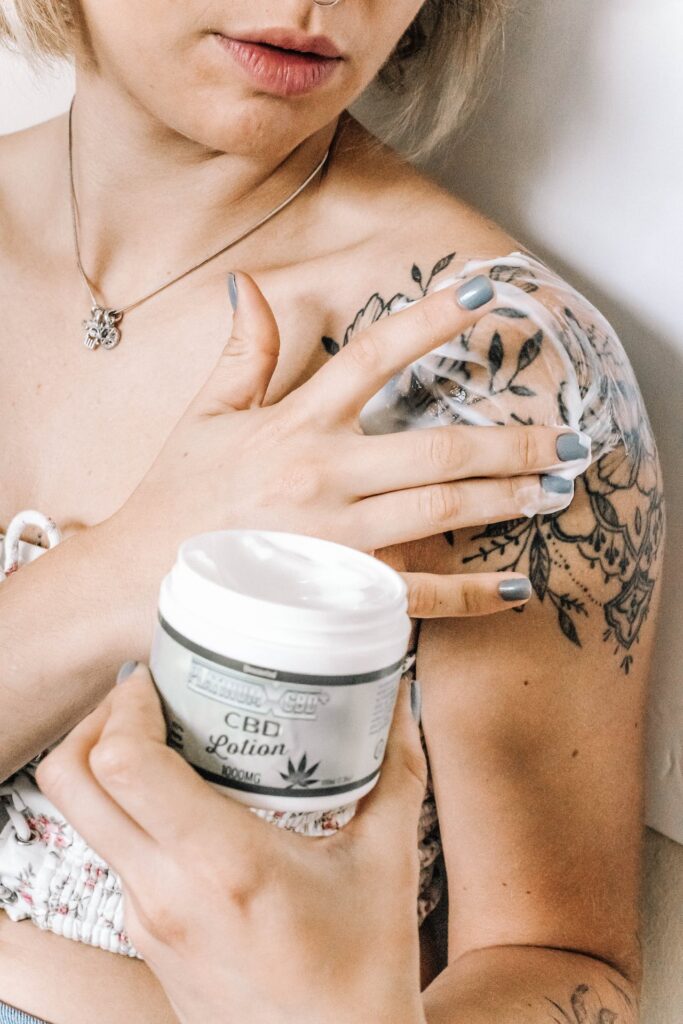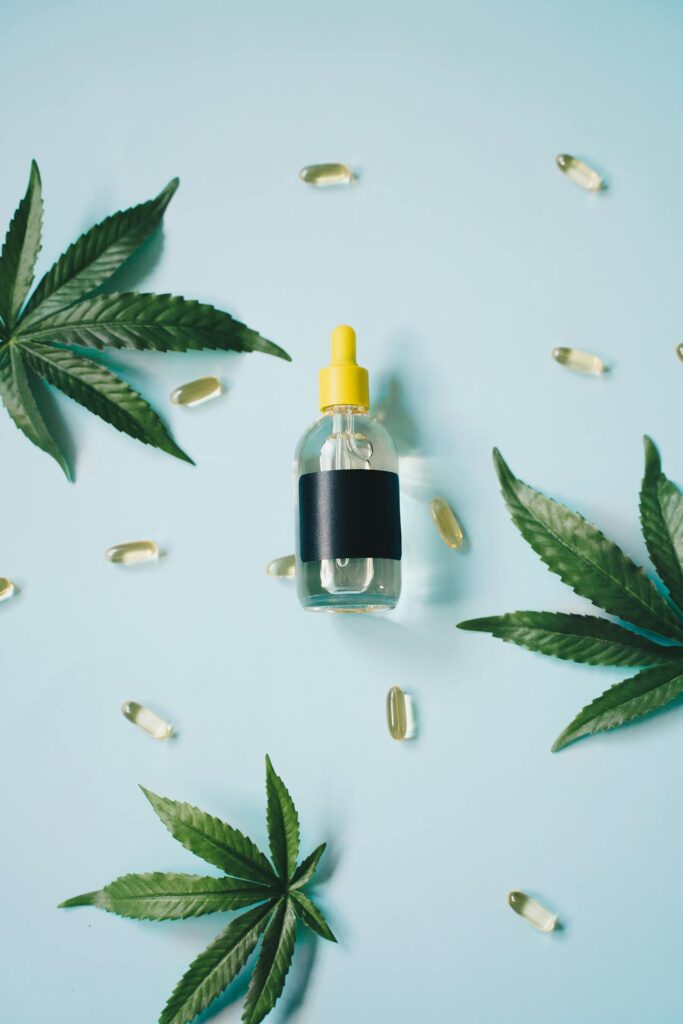Cannabidiol (CBD) is a natural extract found within hemp and cannabis plants (Cannabis sativa L) and it does not contain Tetrahydrocannabidol (THC) the psychoactive component of cannabis, the part of the plant that gives you a high. CBD is legal in the UK. Please purchase from a reputable source so CBD content can be verified, hence daily recommendations can be applied.
Cultivation
These cannabis plants are cultivated from seeds that contain less than 0.2% THC, soil is usually required, however, hydroponics (water-based nutrient solution) or aeroponics (again water delivered as a mist to deliver nutrients) can be used.
Cannabis plants flourish in warmer environments, with optimal temperatures of 24 to 30 degrees Centigrade ( 75 – 86 degrees Fahrenheit) with lots of artificial light (or natural) post-germination till flowering. However, the ‘Gas Lantern Routine’ has been successful for the growing of this plant ( alternating light schedule)… saves a significant amount of energy.
Flowering is initiated by the increase in the length of a dark cycle (hormonal reaction). Some Indica varieties require as little as 8 hours of dark to flower, whereas some Sativa types require up to 13 hours.
Humidity is a very important part of cultivation. For optimal growth, a humidity of between 40-60% is ideal also fertilizers and water are supplied sparingly when needed (water-logged plants do not survive).
To remove the CBD from the plant, it is most commonly extracted by soaking the hemp in the solvent which strips the cannabinoids. Evaporating this then yields pure concentrated high-level CBD oil which is tested to ascertain % concentration.
Why use CBD
A small clinical trial published Nov 2022 concluded the anxiolytic properties of CBD which indicated that there is a huge potential for CBD to be used, as a strategy, for the treatment of moderate to severe anxiety. November 2022 – Clinical cognitive improvement
These findings found a significant improvement in general well-being, measuring primary outcomes. With this in mind and the alarming figures where approximately 34% of adults in the USA are clinically diagnosed with an anxiety disorder during their lifetime (above study), and in the UK, over 8 million people are experiencing an anxiety disorder at any one time (Mental Health UK) and less than 50% of people with generalised anxiety disorder access treatment (Mental Health Foundation). CBD could be the answer to relieving the mentally and physically debilitating effects of anxiety and other mental health issues, many of us (including myself) live and function daily.
There are an estimated 6 million people in the UK and 33% of people in the US using CBD products. The cannabidiol market size was a massive 12.8 billion USD in 2021 estimated to grow by 21.7% between 2022-2028. CBD is an expanding health industry with unbiased research behind it to back the positive results of using within guided parameters.
‘The UK Food Standards Agency issued advice that ‘healthy adults’ should limit their consumption of CBD to 10mgs a day, this equates to about 4-5 drops of 5% CBD a day’
Method of use (administration)
CBD Oil (sub-lingually)
CBD Capsules or Gummies
CBD – Topical – lotions or creams
CBD – Sprays
Inhalation
Tea

What ailments can be alleviated/minimised by the use of CBD
Pain
Cannabis has been traditionally used as a medicine as far back as 2900 BC by many cultures, originating in China. The mechanism by which CBD helps to reduce chronic eg. arthritis and neuropathic (nerve) pain is relatively simple. The endocannabinoid system is involved in regulating functions such as pain. Our body produces neurotransmitters called endocannabinoids that bind to our own naturally occurring cannabinoid receptors. Research has shown that CBD targets endocannabinoid receptor activity, reducing inflammation and interacting with these receptors. This system is also involved in regulating many other functions of the body – metabolism and appetite, anxiety, and general mood and pain perception.
Anxiety and other mental health disorders including PTSD
CBD’s ability to calm and relax is one of the most popular effects when using CBD as an oil or vape and we have already touched on the use for anxiety above November 2022 – Clinical cognitive improvement…..
Please refer to the blog When the Drugs Don’t Work to read about how the use of both CBD and THC (Tetrahydrocannabinol) one of many compounds within the Cannabis plant work together to create the ‘entourage effect’ complement each other, increasing benefits and enhancing the effects of CBD… nature working in harmony.
The Entourage Effect using both CBD and THC also shows promise in alleviating symptoms from Amyotrophic lateral sclerosis (ALS) an awful disease with no known cure that causes nerve cells in the brain and spinal cord to deteriorate, resulting in loss of muscle control. Research in 2019 reported that there was a high level of satisfaction with participants when using both CBD and THC, with satisfaction increasing with a higher level of muscle tightness and stiffness (spasticity).
Ease Diabetic Complications
CBD helps reduce the effects of high glucose levels on other cells of the body, which could typically cause issues within artery walls and other diabetic complications. During a small study, researchers found that CBD decreases a patient’s levels of resistin (causes insulin resistance) and increases glucose-dependent insulinotropic peptide (releases insulin from digested food). This research, although more needs to be completed suggests CBD could become a natural method for treating diabetes and by assisting the body to regulate insulin-related hormone levels. CBD and Diabetes
Treat Selected Epilepsy Syndromes
The Food Standards Administration (FDA) in 2018 approved the use of CBD-branded Epidiolex to treat seizures resulting from Lennox-Gastaut and Dravet syndrome. When prescribed CBD decreased the frequency of seizures.
Both Lennox-Gastaut and Dravet syndrome have been approved by NICE (National Institute of Clinical Excellence) to be prescribed on the NHS for the use of Medical Cannabis. Please refer to the blog When the Drugs Don’t Work
Treat Opioid Addiction
Studies have shown that CBD can help with the symptoms of opioid addiction (as well as many other addictions – cigarettes/alcohol). CBD significantly reduces users’ cravings, withdrawal anxiety, resting heart rate (HPA), and salivary cortisol levels (SAM).
SAM and HPA (markers related to stress – read the link if you want to know more about these markers).
Along with all these positive uses for a magical natural herb studies (2023) – Therapeutic potential have also shown that CBD and THC can help protect us from neurological disease due to their clever antioxidant and anti-inflammatory properties along with the positive effects it has already diagnosed neurological diseases.
CBD can help with sleep issues, creating a relaxed and calm state assisting to initiate sleep. Insomnia can be so debilitating causing severe physical and mental problems (anxiety/heart disease/weight gain).
If you are interested in learning more about Medical Cannabis please visit Nomadify.co.uk
Love Life x
Links you may be interested in:


Pingback: CBD and Dogs – aka your best friend… both – Nomadify